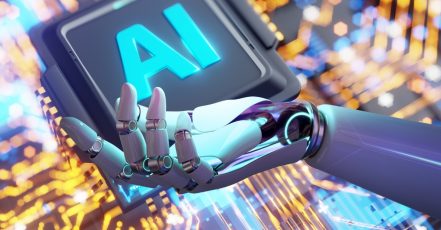Artificial Intelligence (AI) is a fascinating topic, and its application is seen by many people as a facilitator and "performance booster" in their professional tasks. But can AI tools also help boost performance in professional event management? Yes, they can. AI can be used to make stage performances more interactive and to facilitate the pre- and post-event management phases, especially for events in a business context.
Artificial Intelligence can be a real performance booster, not only in business areas such as IT, marketing or logistics, but also in event management, especially in the creative design of stage performances. To bring AI on stage, you can demonstrate the capabilities and functionalities of artificial intelligence live to the audience. This can be done in various ways:
Live Presentation of an AI Tool on Stage
You can show the audience how AI works by projecting the usage of an artificially intelligent tool for image recognition, speech processing, text generation, or video creation from the presenter’s notebook onto the screen (or LED wall). The audience can follow the process in real-time.
Live Dialogue with an Intelligent Chatbot like ChatGPT
With AI chatbots like ChatGPT, you can have engaging dialogues, either personally or as part of a stage performance. You can ask the tool questions on specific topics or present a problem that requires a quick solution. The audience sees both the presenter’s inputs and the chatbot’s responses. How quickly AI answers questions and completes tasks in real-time often amazes people and serves as the catalyst for them to explore such tools themselves.
Creation of AI-Generated Artwork
Generative AI tools can be used to create new works of art, and this can also be done on stage with audience participation. Based on various inputs collected, filtered, and transformed into instructions for the AI tool by a moderator, a new painting, poem, or song can be created that becomes the collective artwork of the on-site audience.
AI Robot Performance
This effect is always particularly impressive: a humanoid robot performs tasks on stage or presents information with movements and gestures that closely resemble human motor skills and gestures.
An example of AI robots often used in a business context is "Pepper." It is perfect for point-of-sale service situations and is also well-received at events. Pepper is a real crowd-pleaser and ideal for sparking interest in topics like "robotics" and "AI." Pepper is available for rent from various companies, though it may not handle noisy environments well, so different solutions are often recommended for trade shows.
Onstage, humanoid robots can perform various tasks and provide an impressive display of Artificial Intelligence (AI). Here are some examples of what robots can do on stage:
Presentation and Dialogue
Intelligent robots can present information on stage, deliver speeches, or participate in discussions. They can speak predefined texts or respond to audience questions in real-time.
Movements, Sports, Dance
Advanced humanoid robots can execute complex movements, mimic the movements of various sports, and even dance. The visual effect is always impressive!
Interaction with the Audience
Robots can interact with the audience, answer questions, play games, or even take selfies.
Demonstration of AI Capabilities
Just like a "human" presenter with a relevant AI tool, a robot can demonstrate real-time AI capabilities for facial recognition, speech recognition, or object recognition.
Product Demonstrations
If the event is related to a specific product or service, a suitably "trained" robot can demonstrate the use or advantages of these services in entirely new ways.
In addition to the possible uses of AI in the context of events already mentioned, AI applications can also be used outside the actual event program.
Here are some examples of AI applications for the preparation and follow-up of an event and to support program management:
Use of AI in Event Marketing
Intelligent chatbots can be used on the event website, in the event app, or on relevant social media platforms to answer frequently asked questions from interested participants before, during, and after the event, 24/7.
AI-powered email marketing tools can be used to send personalized invitations, reminders, and relevant information to participants.
Use of AI for Program Management
AI-assisted moderation tools can help monitor comments, questions, and discussions on social media and forums during stage presentations, filtering inappropriate content.
AI-powered translation services enable participants from different countries to follow presentations and discussions in their own language in real-time.
Use of AI in Event Controlling
AI analytics tools can provide real-time insights into participant behavior, satisfaction, and interactions with event activities. This can help adjust and optimize the agenda during the event itself.
After the event, AI can be used to analyze data from participant surveys and social media feedback more comprehensively and quickly, providing better insights for future events.
(Please note: For this article, the editorial team used some AI tools for research, but the text itself was written manually, condensed to essential points, and supplemented with practical knowledge.)
Cover Image: AI x Robotic | eventmasterbook.com Editorial Team

Related topics:
AI in event management, AI for event planning, use of artificial intelligence, event management, event industry, new work, digitalization, creativity, AI, Artificial Intelligence








